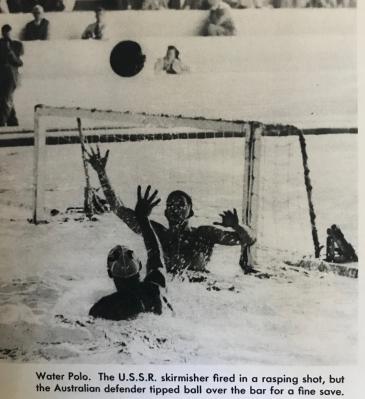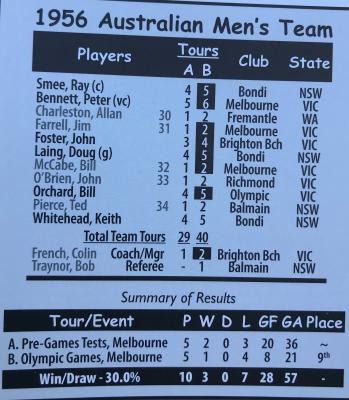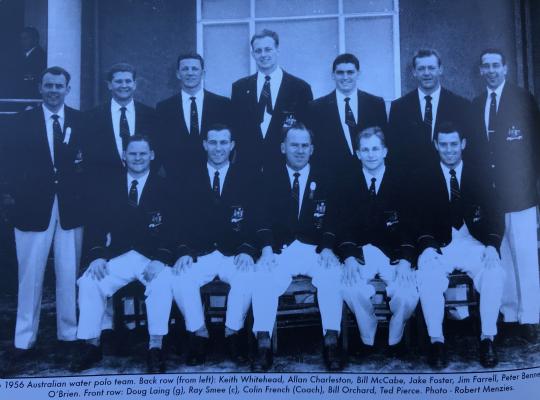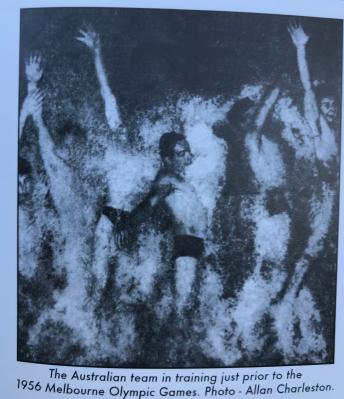Olympian William ‘Bill’ McCabe was a member of the first Australian Water Polo team to win a match at an Olympic Games. It happened 64 years ago this November when Australia ‘toughed it out’ to beat Singapore 3-2 in the ‘loser’s tournament’ at the 1956 Melbourne Games.
Recently, Bill, at 86 the oldest Olympian living on the Sunshine Coast, proved his toughness again, lying unconscious for two days in his Sunshine Beach garden before he was found by a friend and her son and taken the ICU at the University of Sunshine Coast Hospital.
Now fully recovered Bill is living in aged-care at Peregian Springs, and as he told me this week, “I was pulling out bamboo. It gave way and I must have toppled backwards and bumped my head on a rock.”
“I must be stronger than I thought.”
The win over Singapore came after Australia had competed in two previous Olympics, London in 1948 and Helsinki 1952. In London the team was eliminated in the first around by Italy and Yugoslavia, and in Helsinki they lost to Austria and Yugoslavia.
Goalkeeper Bill was a leading player in the very successful Melbourne Club. He was first selected in the Victorian team which was undefeated in the 6th National Championships in Adelaide in 1953. He participated in all National Championships from that year, and in February 1956, was chosen for the 18-man squad to train in September and October for the Melbourne Olympics in November.
After training independently in their own States during the winter months, players went to Melbourne in early September. At the final trials in October 9, players and 2 goalkeepers -Bill and Doug Laing – were chosen to train in earnest at the new Melbourne Olympic Pool.
As host nation of the Olympics, Australia was included as one of 10 teams. After the team moved into the Olympic Village in Heidelberg they played as many other teams as possible to gain some international experience.
Bill said this provided a great opportunity to “become more familiar with the changes in rules which they had been notified about in Australia, but had no practical experience of them in matches. … in those days water polo was dominated by the Europeans.”
One of the joys of those practice matches was making friends with Olympians from other countries. ‘‘Australia and Yugoslavian water polo players seemed to laugh at the same jokes and enjoy our beer, and we got on well with them.”
Australia was pooled in an extremely strong group – Yugoslavia, USSR and Romania, which at the time were ranked international as 1st, 4th and 6th, respectively.
In their first match against Yugoslavia, Australia played well in losing 2-4. As Water Polo historian Tracy Rockwell has stated “In reality the Aussies were very unlucky and this game should have been their first Olympic success”. However, when asked about this particular match, Bill surmised “their Yugoslavian ‘friends’ may have helped the match finish as close as two goals.”
Romania and the USSR also beat them before Australia won against Singapore in the ‘loser’s round’ – “it was a thrill to be the first team to win an Olympic-level match.”
Upon reflection, Bill said the isolated Australian polo players “needed more international experience.” Whereas the Australian team in 1952 had travelled throughout Europe for several weeks playing ‘warm-up’ matches – won 19, drew 1, and lost 14 – in the four years leading into the Melbourne Olympics, no member of the team had played internationally.
Only six of the 11 players of the 1956 team had played in Europe four years earlier.
Bill recalled many highlights of those 1956 Melbourne Games:
– marching in the Opening Ceremony – “yes, marching, not like today; we had the best Sergeant Major who really drilled us,
“the discipline and depth of the competitors from the United States” and
“the mingling of the competitors from all nations in the Closing Ceremony; it was the Olympic Spirit personified”.
Bill suffered a head injury and was unavailable for selection for the 1960 Rome Olympics. However, he sailed in another ship to Rome and was well-looked after by members of the Australian team. On some occasions he would wear an item of Australian team clothing and be hustled through the gates and watch matches “as a teammate”.
Post-Rome Olympics, Bill played and coached his Melbourne Club for several years, but “the Esso Oil Company moved me around Australia quite a lot.” In the 1970s he played for the successful Tugun Club on the Gold Coast before being transferred to Tamworth, which had no heated pool.
Bill said in the interview he was the sole survivor of the 1956 Water Polo team. How fortunate he survived laying unconscious for two days a few months ago as he has so much more to offer. For example, we didn’t get beyond his initial season of Australian Football in 1957 with North Melbourne in the days of VFL. Next time, Bill!
(Ian Jobling is Honorary Director of the UQ Centre of Olympic Studies at the University of Queensland)












